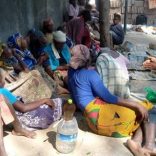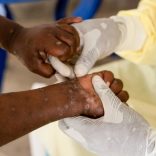Mozambique: Authorities report 114,000 under fives suffering acute malnutrition
Think tank warns against political intolerance – AIM report

File photo / Salvador Forquilha
Salvador Forquilha, director of Mozambique’s leading independent think tank, the Institute of Economic and Social Studies (IESE), on Tuesday warned against “the political intolerance and aversion to thinking differently which has, unfortunately, been characterising our country in recent years”.
Speaking in Maputo at the opening of IESE’s fifth international conference, Forquilha recalled that IESE researchers had often been called “anti-patriotic” or “apostles of misfortune”, and had suffered threats and intimidation “seeking not only to discredit the work of the institution, but also to silence their voices”.
He recalled how, in May 2014, just three months before the previous IESE conference, IESE had suddenly received an eviction notice giving it just 15 days to leave the building where it had rented office space ever since its foundation in 2007.
The “somewhat hostile environment” that IESE had sometimes experienced, he continued, “expresses a political context which has deteriorated significantly”.
While at the start of the era of multiparty democracy in Mozambique, in the early 1990s, “the country seemed to be taking important steps in valuing and protecting individual and collective freedoms, it could be difficult to say the same for the last ten years”, declared Forquilha. He noted how international reports on democratic governance in Africa, such as the 2016 “Ibrahim Index of African Governance”, had shown a fall in Mozambique’s ranking, regarding indicators on human rights and accountability.
It was very easy, and even politically convenient, Forquilha added, to think that outside forces, or blind fate, were behind the crises that Mozambique has been living through. “But it is important to understand”, he stressed, “that poverty, misery, political instability and war cannot be seen as destiny. They are largely the product of policy options of the governing elites”.
“Understanding this is fundamental”, he said, “in that it is an important condition for seeking solutions to our crisis – a search for solutions that involves the re-invention of our political system, so that it can respond better to the challenges of the country”, including “the construction of a democracy based, not on voters, but on citizens”.
The conferences held by IESE every two years, Forquilha said, “are extremely important spaces for the dissemination, debate and reflection on relevant questions for economic, social and political research”.
They had also become “moments of reflection on the role that the social sciences can play in the development of our societies, particularly regarding public policies and development options”.
The current three day conference is being held on the theme “Challenges of Social and Economic Research in Times of Crisis”. One reason for choosing this theme, said Forquilha, “is the context we have been living through recently, a context marked by an international and national social, economic and political crisis. Analysing the dynamics of this crisis is, without doubt, a challenge of extreme relevance for our research,
Forquilha pointed out that IESE came into existence “as the ripening of the dream of a group of Mozambican academics who, unhappy with the stage of research in the universities, decided to set up an independent research institute, entirely devoted to scientific research, in order to produce relevant research about the socio-economic and political dynamics of Mozambique and the region, in order to feed the debate on development policies and options”.
The current conference has attracted dozens of speakers from Mozambique and abroad. Over the three days, 103 papers will be given in 30 panels, discussing themes such as “Modes of accumulation, growth patterns and crisis”, “Paradoxes and trends in the world economy”, “Poverty and challenges of the demographic transition”, and “Formation and transformation of the state”.












Leave a Reply
Be the First to Comment!
You must be logged in to post a comment.
You must be logged in to post a comment.